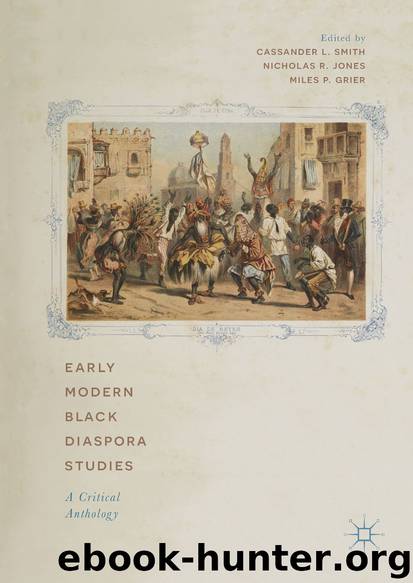Early Modern Black Diaspora Studies by Cassander L. Smith & Nicholas R. Jones & Miles P. Grier

Author:Cassander L. Smith & Nicholas R. Jones & Miles P. Grier
Language: eng
Format: epub
ISBN: 9783319767864
Publisher: Springer International Publishing
Candy, the Naïve Witness
Tituba manipulated the Salem Witch Trials through her knowledge or eye-witness accounts. Candy survived the trials through dissimulation, adopting a persona of ignorance. Although we do not know as much of Candy’s biography as we do of Tituba’s life, we can reasonably surmise the process by which she arrived at the Salem courthouse on Monday, July 4, 1692. Generally, the process followed this pattern: A person is first accused by another person claiming affliction. A warrant is issued to arrest the accused party. Magistrates then examine the accused and decide whether there is credible proof of the person’s guilt. If magistrates deem they have just cause, they jail the accused, who then awaits trial. Then the accused goes before a grand jury. If indicted by a grand jury, the accused then stands trial in the Court of Oyer and Terminer , convened in 1692 specifically to hear witchcraft cases. The trial is rendered before a jury. If found guilty, the convicted witch is sentenced to hang. Candy faces indictment by a grand jury, leading up to the recorded moment of her examination with which I began this chapter. I return now to that moment, quoting it in its entirety to focus even more closely on the diction and semantics. Like Ashley Williard does in her chapter in this section, I understand mediation as a collaborative process that can tell us something about the agentive spirit of mediated figures.
To begin, note how emphatic the magistrates’ opening question is, “Candy ! Are you a witch?” Candy answers just as emphatically, “Candy no witch in her country. Candy’s mother no witch. Candy no witch, Barbados . This country, mistress give Candy witch.” On the surface, Candy’s initial response appears to ramble. There is a semantic and diction break between “witch” and “Barbados ” in her denial that suggests a certain incoherency. Furthermore, she does not exactly answer the question. Rather than deny she is a witch, she qualifies that she is not a witch in her own country. After this, her denial turns into a confession—or maybe not. The diction reads ambiguously with her use of the verb “give.” Does she mean that her mistress turns her into a witch, simply shows her witchcraft , or gives her the label of witch because of what she had practiced, had learn from her own mother in Barbados ? Also, there is another odd juxtaposition with the words “this country” and “mistress” so that without a preposition, it is unclear who or what gives. For all the confusion of her opening words, the meaning still is clear essentially. In her home country, regardless of what Puritans might believe, she was no witch.
In his follow-up question, “Did your mistress make you a witch in this country (italics my emphasis)?” the examiner makes several assumptions. He inserts the preposition “in” to clarify exactly where Candy learned witchcraft , and he interprets “give” to mean “make.” He rewrites her Pidgin English, interpreting her words as a confession.
Download
This site does not store any files on its server. We only index and link to content provided by other sites. Please contact the content providers to delete copyright contents if any and email us, we'll remove relevant links or contents immediately.
| Ancient & Classical | Arthurian Romance |
| Beat Generation | Feminist |
| Gothic & Romantic | LGBT |
| Medieval | Modern |
| Modernism | Postmodernism |
| Renaissance | Shakespeare |
| Surrealism | Victorian |
4 3 2 1: A Novel by Paul Auster(11035)
The handmaid's tale by Margaret Atwood(6838)
Giovanni's Room by James Baldwin(5873)
Big Magic: Creative Living Beyond Fear by Elizabeth Gilbert(4719)
Asking the Right Questions: A Guide to Critical Thinking by M. Neil Browne & Stuart M. Keeley(4567)
On Writing A Memoir of the Craft by Stephen King(4206)
Ego Is the Enemy by Ryan Holiday(3982)
Ken Follett - World without end by Ken Follett(3968)
The Body: A Guide for Occupants by Bill Bryson(3791)
Bluets by Maggie Nelson(3705)
Adulting by Kelly Williams Brown(3663)
Guilty Pleasures by Laurell K Hamilton(3578)
Eat That Frog! by Brian Tracy(3509)
White Noise - A Novel by Don DeLillo(3430)
The Poetry of Pablo Neruda by Pablo Neruda(3358)
Alive: The Story of the Andes Survivors by Piers Paul Read(3304)
The Bookshop by Penelope Fitzgerald(3222)
The Book of Joy by Dalai Lama(3212)
Fingerprints of the Gods by Graham Hancock(3207)
